ARIX Technologies is revolutionizing industrial corrosion management for safety and sustainability with a proprietary robotic inspection solution paired with a robust data analytics platform, paving the way for next generation 'smart industry' and a more sustainable future.
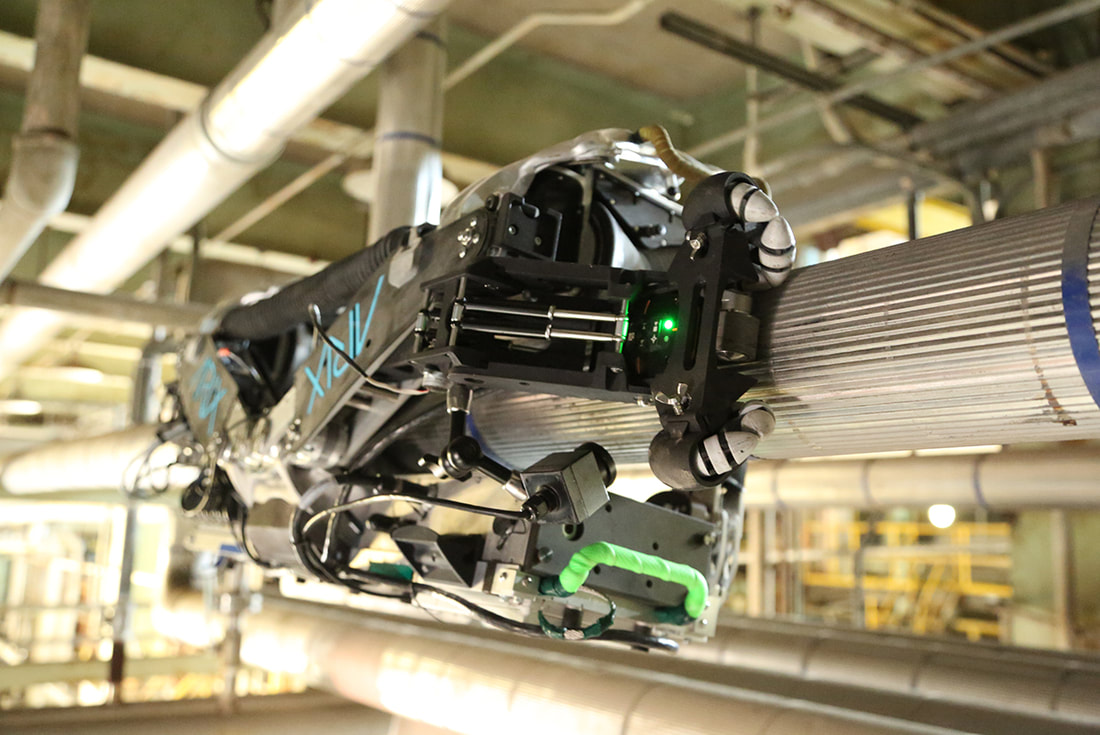
Plum Alley is excited to announce a new Series A investment opportunity in ARIX Technologies. The Company is raising a $10M Series A round at a $23M pre-money valuation. Plum Alley has secured allocation for both our SPV Investor Members and the Plum Alley Ventures Fund I.
The round is led by Alley Robotics Ventures, by MongoDB founder Elliot Horowitz and Kevin Ryan’s AlleyCorp, with participation from Benson Capital, the Natural Gas Innovation Fund from Canada, and several earlier investors such as Contour Ventures. Another early investor includes Stanley Black & Decker who conducted extensive technical and IP diligence.
The Series A funds will be used to continue building out the operations team, including in-field operations and assembling, the software team, to augment their ability to service existing and pipeline demand, and business development team, to further build out and realize the existing customer pipeline.
Fundraising History: ARIX Technologies has raised $7M to date, primarily via a Seed round led by Contour Ventures with participation from Stanley Ventures, Dorm Room Fund, and College Street Innovation Fund. They also graduated from Shell GameChanger and National Science Foundation Bootcamp.
* Smart Infrastructure for Sustainable Future: Utility, energy, chemical and manufacturing companies are adopting new technologies for greater transparency and data analytics in pursuit of sustainable infrastructure management, reduced environmental impact and enhanced efficiencies. A recent study revealed that natural gas leaks were nearly 60% higher than EPA estimates leaking millions of tons of methane each year. Recently, 100 COP26 leaders committed to 30% reduction of methane emissions by 2030. Major companies like ConEd, 3M, ExxonMobil and BP have also announced emission pledges. Advanced technologies focused on preventing pipe failures and combatting emissions play an important role in averting industry disasters and reducing harm to the climate and human health.
* Massive Market Ripe for Disruption: With tailwinds from regulatory bodies, societal expectations, and industry itself, the market opportunity for advanced technologies delivering actionable data intelligence and analytics for industrial applications is enormous. A recent Grandview Research report estimated the global pipe monitoring market was $14B in 2021, growing to $26B by 2030. ARIX estimates its serviceable addressable market for pipe inspection in oil & gas and chemicals alone is more than $5B with even larger potential when including utilities, water and gas distribution. Beyond pipe inspection, the industrial analytics market is projected to grow at a rate of 17% per annum from $15.6B in 2019 to $55.5B by 2027.
* First to Market, Next Gen Solution: Many industrial plants still use manual pipe inspection, which frequently results in inadequate and inconsistent data, and is often rife with safety issues. For early adopters of new technologies, there are material shortfalls in first generation robotic solutions, including insufficient functionality for traversing insulated pipes. Notably 60-70% of pipes for oil & gas are insulated. ARIX’s patented, next generation technology transcends these issues providing an exponential improvement and accomplishing in a day what currently takes weeks, at a fraction of the cost.
* Superior Founder / Product Market Fit: As an experienced mechanical engineer and analyst from the oil & gas industry, ARIX’s founder Dianna Liu saw first-hand the enormous opportunity to build an automated and intelligent pipe inspection and data analytics solution for customers. She launched ARIX while obtaining her MBA from Yale, winning several entrepreneurial awards and recruiting her team with the express purpose of designing a superior solution to solve the customers’ biggest pain points with a platform designed to be cheaper, better and faster.
*Sticky Business Model & Customer Base: ARIX is targeting a two-pronged business model with Robotics-as-a-Service and their new Data Analytics SaaS Platform offering. With their autonomous robotic inspection capabilities combined with superior data analytics & predictive capabilities, ARIX value to customers will increase dependency on their platform offerings. They’ve also designed a business model with multiple sales points and a multi-year contract approach across their beachhead markets, enabling a land and expand strategy with diverse and sticky revenue generation.
* Scaling Progress, Accelerating Revenues: ARIX has already secured several multi-year, multi-million dollar contracts with large multinational brands across three industry verticals - utilities, oil & gas and chemicals. Within the existing customer base, they have $150M in revenue potential. Existing customers include ConEd, ExxonMobil, Cenovus Energy, SABIC, ChevronPhillips among others. Targeted ARR for 2023 is more than $5M with nearly 50% in recurring revenue.
* Series A Opportunity: The Company is raising a $10M Series A round at a $23M pre-money valuation, led by Alley Robotics Ventures, backed by MongoDB founder Elliot Horowitz and Kevin Ryan’s AlleyCorp, with participation from Benson Capital, the Natural Gas Innovation Fund from Canada, and several earlier investors such as Contour Ventures. The Series A funds will be used to grow the sales and operations team, expand their data analytics team and product functionality and to build out their business development team to capitalize on the demand from existing and pipeline customers.

As a mechanical engineer and analyst, ARIX Technologies Founder & President Dianna Liu experienced firsthand the manual, inefficient and unsafe infrastructure management processing being utilized by major industry players. During her time at ExxonMobil, she worked directly with pipe inspectors taking insufficient data from manual inspections to extrapolate the firm’s pipe corrosion analysis. In search for an optimal solution, Dianna vetted numerous offerings to find little innovation to bring advancements in robotics, AI and ML to infrastructure management for pipe corrosion. From big players like GE and Siemens to VC-backed robotics companies, solutions fell short of addressing customer needs.
Harnessing her domain expertise, Dianna embarked on building a superior solution designed to be cheaper, better and faster, while unlocking the power of greater data transparency, enhancing worker safety and reducing negative environmental risks. Dianna identified a massive opportunity to create a big data, machine learning driven pipe corrosion analytics platform. From the beginning, ARIX was designed to tackle two critical customer pains points: 1) inadequate data to create a robust data corrosion analytics software platform and 2) inefficient, highly manual and expensive pipe inspection solutions. The existing inspection solutions are either manual or first generation robotics with inadequate data capture.
ARIX Technologies brings next-gen intelligence combining advanced robotics and sensors with a robust data analytics platform to revolutionize industrial corrosion management enabling data driven optimization of pipe maintenance, leak prevention and resource management.
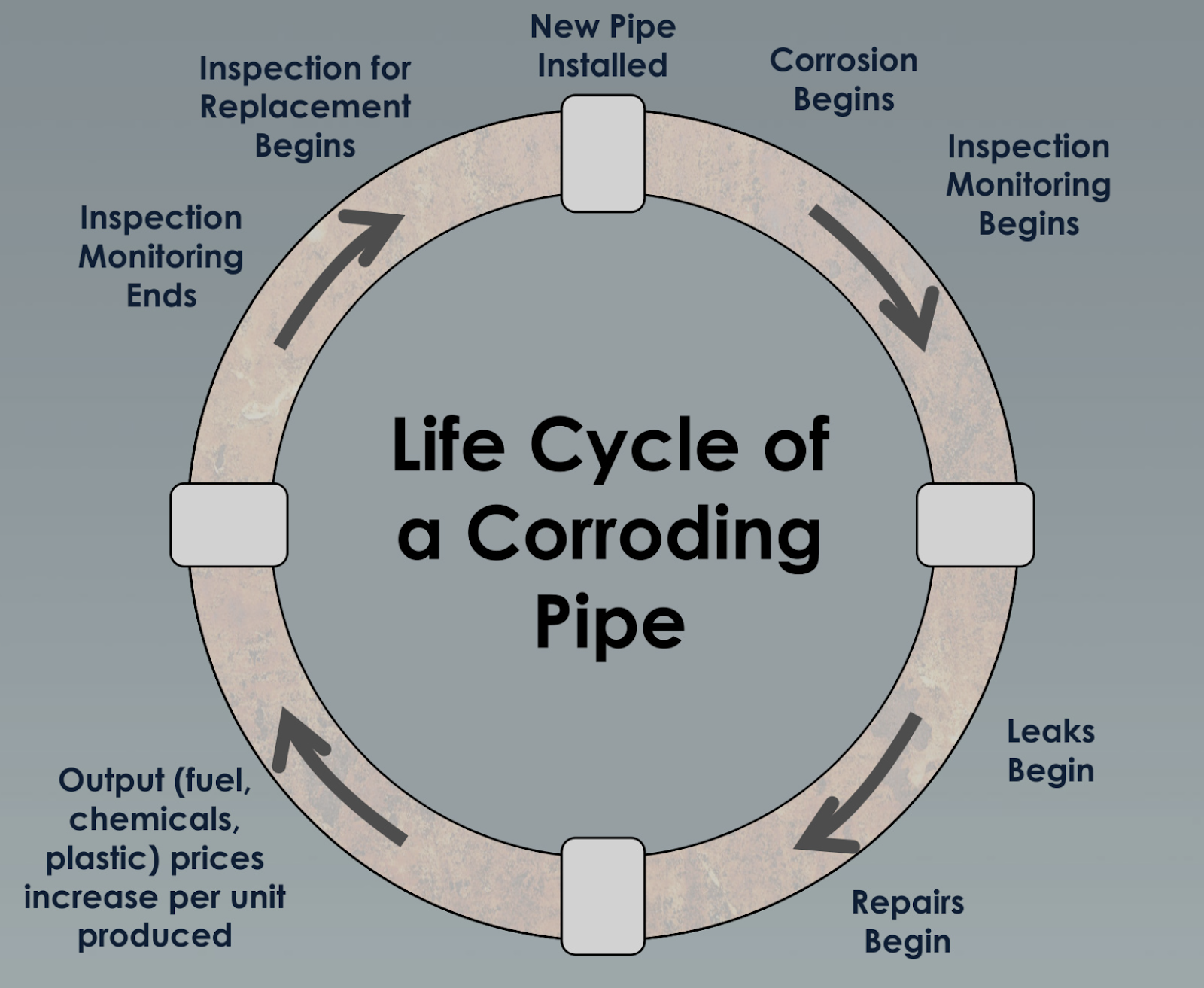

ARIX’s multimodal integrated solution includes a next generation robot for pipe inspection and a proprietary ML-driven corrosion data analytics platform. Dianna and her team of engineers designed a robot capable of traversing all pipes, including insulated and underground pipes, while capturing continuous pipe-health data that feeds into a proprietary software platform, which in turn creates a digital twin enabling modeling and predictive capabilities for maintenance and repair needs alongside resource optimization. By digitizing a costly and inadequate critical system process, the Company can quickly spotlight areas of concern allowing engineers to preemptively identify critical pipe corrosion maintenance to avoid costly downtime or dangerous leaks. Data driven pipe inspection at the plant level with aggregation capabilities at HQ unlocks enhanced safety, profitability and sustainability.
Autonomous Robotic Pipe Inspection Technology
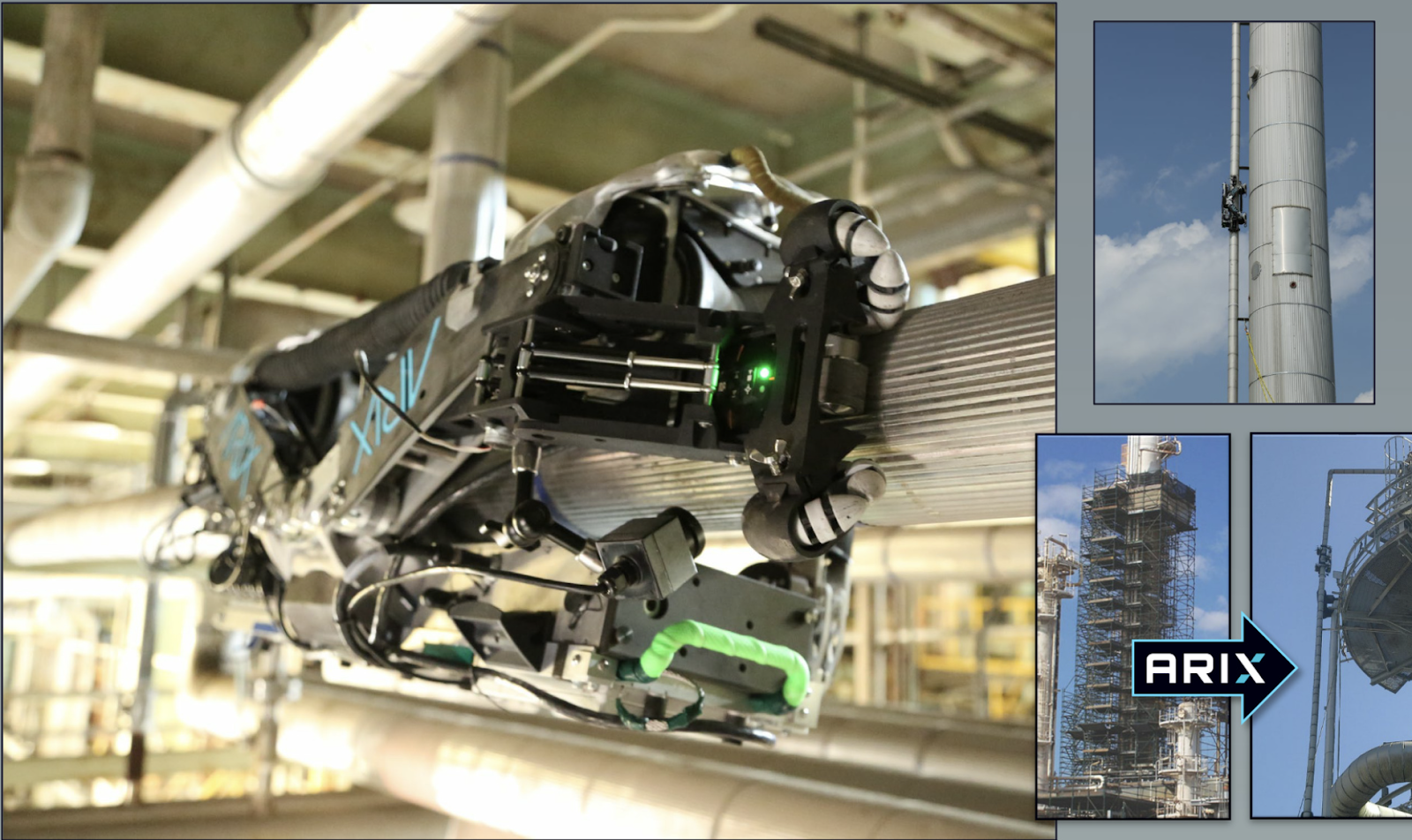
Superior, Patented Design: ARIX has 10 patents (6 filed, 4 pending) on its robotics-as-a-service platform focusing on its modular pipe traversing apparatus, attachment design, sensing, controls, and fail-safe mechanism. ARIX has the only commercialized robot that both climbs vertically and scans insulated pipes. It is unique in how it mechanically grasps the pipes, traverses horizontally and vertically, and maneuvers around barriers. Unlike other inspection robots, ARIX does not use magnets, which are problematic for many pipe materials, interfere with field sensors and are less sturdy under weathered conditions. They have designed numerous safety features that match industry standards. For example, in the case of an emergency shut down, the robot clings to the pipe in its static state without electricity. It is one of the only robots on the market that conducts non destructive testing on insulated pipes, which means that inspection can be made without insulation removal- this is a huge market opportunity given the high percentage of insulated pipes.
Industry Accepted Scanners: ARIX’s robot is designed to hold multiple types of scanning equipment. Currently, the Company uses off-the-shelf sensors widely utilized across the industry. This was a strategic decision to avoid any change management of inspection protocol for customers, increasing customer adoption and deployment rates. Notably, new sensor technology is not seeing meaningful customer uptake. For example, LiDAR has potential as a scanning technology, but it requires internal FDA-like review from every company detering adoption. Existing sensors also enable versatility- ARIX can adapt to varying needs and budgets of clients. The Company is building a moat with customers as the leading provider of semi-autonomous and ultimately, fully-autonomous pipe inspection. They do anticipate future opportunities to incorporate emerging scanners in their robot and potentially expand their product offering by building in-house advanced scanners.
The robots are currently inspecting through three technologies
* Visual inspection (VT)
* Pulsed Eddy Current (PEC)
* Real-Time Radiography (RTR)
Productivity and Affordability: ARIX’s solution can accomplish in a day what it takes weeks for other solutions to inspect. Further, ARIX’s robot collects continuous data points versus sporadic point measurements spread across 20-40 feet of pipe. The ability to semi-autonomously capture a much wider set of continuous data feeds ARIX’s corrosion analytics platform, further differentiating them from other solutions. Existing inspection offerings can take 2-3 weeks to conduct due to the multiple suppliers and steps. This is particularly the case for the majority of plants with insulated pipes. Manual inspection and existing robotic solutions require the removal of insulation, which is time consuming and costly. Existing robots also require frequent manual repositioning as they are not designed to move around obstacles. ARIX can inspect pipes within two days and removes the need for multiple suppliers. They have priced their product to match the average customer spend per day with the potential to double or triple the percentage of pipes inspected, creating enormous economies of scale.
Big Data Corrosion Analytics Software Platform:
ARIX’s corrosion data analytics software organizes and analyzes data, and provides recommendations so that teams can make data-driven decisions. The entry point mission portal and inspection report displays the data collected from robotic inspections in a meaningful and visual way.
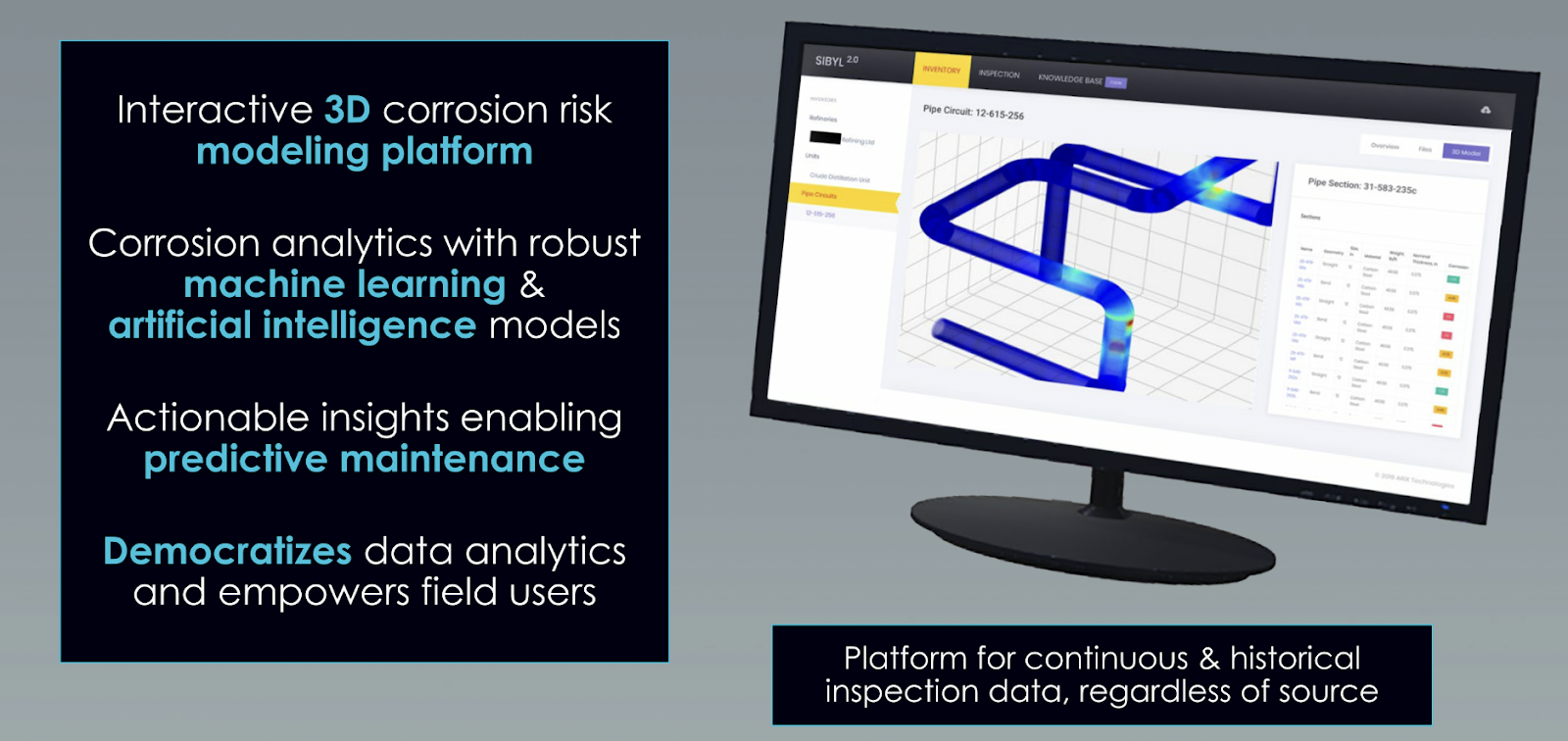
The analytics portion of the platform, ARIX Analytics, contains multiple tiers of analytics and customization. Current and historical data can be aggregated from multiple sources and technologies to generate more robust and precise analytics, making their platform complementary to other technologies and scanning equipment. Some key features include 3D corrosion risk modeling, a digital twin that shows current and projected pipe conditions. The pipe is split into small sections and has specific data points like measurements and scanning videos attached to each section.
Industry Tested: The data analytics platform was tested in a pilot Cenovus Energy, the multinational Canadian energy company with a market cap of $18B. ARIX Analytics ingested 150,000 historical pipe data points from Cenovus and produced significantly increased accuracy and output analysis. ARIX Analytics reduced the error in prediction by 50%. In terms of predicting when pipes reach the safety allowance before hitting a critical state, the error of linear regression could be off by more than two years. ARIX predicted the alliance within a 10 month error window.

The market size for ARIX Technologies represents an enormous opportunity. Industrial companies are increasingly adopting emerging technology, particularly in AI/ML, big data, drones and robotics in pursuit of transitioning to ‘smart infrastructure’ and ‘intelligence plants’.
Historical data has shown that the total cost for corrosion on production & manufacturing across oil & gas, chemicals, utilities and manufacturing is $17.6B in the U.S. alone. In a recent report released by Grandview Research, the global pipe monitoring market was $14B in 2021, and projected to grow to $26B by 2030. Within this market, ARIX estimates its serviceable addressable market for pipe inspection in oil & gas and chemicals alone is more than $5B, with even larger potential when including utilities, water, and gas distribution. These sectors rely on expensive, dangerous and time consuming methods to monitor pipe corrosion that produce isolated point measures, allowing for unseen risks to slip through and cause significant damage to the plant, employees, and surrounding environments. Unplanned outages can cost a plant over $1M per day in lost productivity.
In addition, industrial analytics is a rapidly growing market. Per a report on the growing industrial analytics market from Reports and Data, the current total global market size reached $15.6B in 2019. Due to the growing importance of industrial data analytics, this total is expected to balloon to more than $55B in the next 4 years. Industrial analytics have undergone significant innovation through advancements in analytic techniques and algorithms, coupled with ML and AI, and are used to examine a huge amount of data garnered from the industrial systems.
Energy, utilities and manufacturing, the core market segments ARIX is targeting, make up approximately 40% of that total, resulting in a $22B market segment by 2027. In these segments, the need for proactive monitoring and maintenance is essential to maintaining critical infrastructures and avoiding disastrous events. Data analytics solutions improve these efforts through both predictive insights and rapid response, providing massive value to operators.
ARIX Beachhead and Customer Traction: With their dual product offering, ARIX is positioned to capture market share across both the pipe inspection and industrial data analytics markets simultaneously. The Company has identified a short term beachhead global target market (assuming 1% penetration) worth nearly $250M in revenues just through oil & gas and chemical plants, comprising nearly $100M in inspection services revenues and $150M in software licensing revenue. Three of ARIX’s existing customers represent 40+ plants, or 5%+ of the global market with annual pipe inspection spend eclipsing $8B. With further penetration in oil and gas, chemicals, and utilities, ARIX can unlock further value with an integrated inspection hardware and software analytics solution.
ARIX has already secured several multi-year, multi-million dollar contracts with large multinational brands across three industry verticals - utilities, oil & gas and chemicals. Existing customers include ConEd, ExxonMobil, Cenovus Energy, SABIC, ChevronPhillips among others. Targeted ARR for 2023 is more than $5M with nearly 50% in recurring revenue.


ARIX operates a two-pronged business model with Robotics-as-a-Service offering and Data Analytics SaaS Platform offering. The Company’s business model offers diversified and sticky revenue generation while using a nimble approach to meet customers where they are and drive more rapid industry adoption. Notably, the two offerings are not required to be integrated. Customers can contract with ARIX for the Robotics-as-a Service solution to start and upgrade to integrate with their Data Analytics Saas Platform.
Inspection Robotics-as-a-Service: ARIX provides their robots and inspection engineers to clients through a hardware-as-a-service leasing model. This was a strategic decision to drive rapid customer adoption and prioritize building trust with clients, while positioning the Company to expand with customers as they acclimate to a fully autonomous and integrated offering. ARIX has also used domain expertise from the industry to optimize their pricing model.
Inspection budgets for plants and refineries fall under operating expenses, making it a prime opportunity for the leasing model. Within oil & gas, the average refinery spends $20M per year on inspection, typically priced at a daily rate of $10k / day. ARIX has seen strong customer adoption using this pricing model where they lease 1 robot + 2 inspectors for $10k / day. The Company is able to achieve 50-80% margins. While ARIX’s robot is capable of running fully autonomously, the Company believes it will take some time for customers to adopt fully autonomous robotic inspection. ARIX’s team has already tested this with an engineer in Europe running an autonomous robot in Texas. With their customer insights, they’ve built into contracts deploying 2 inspectors per robot. This can be easily modified as customer trust increases with their autonomous robotic inspection capabilities, which will drive greater economies of scale and increased margins.
ARIX’s growth strategy includes scaling through increasing the number of robots, expanding plant adoption, entering different industrial markets, and increasing robot functionality. Their goal is to capture a large percentage of the average $20M per plant spent on pipe inspection alongside the growing capital allocation at the plant and HQ level for data analytics.
Data Analytics Software Platform:
ARIX has completed the first version of their data analytics software platform and secured Cenovus as their first customer. The Company has designed the offering with a classic SaaS revenue model charging an annual licensing fee. As ARIX expands their analytics platform, they plan to offer a three tier pricing model for customers.
ARIX has also structured the product to enable entry level Tier 1 licenses at the plant or refinery, which ranges based on the number seats per refinery. The team anticipates more robust data analytic and modeling features will be licensed at the HQ level creating multiple entry points and upsell opportunities with existing customers for different organizational roles. The data and basic reporting capabilities are included with the robot inspection offering. By offering entry level data visualization with robotic inspections, ARIX aims to drive customer conversions for the software platform at the refinery and HQ level.
The software portion of their business is transitioning from pilot to customer adoption with an existing customer waitlist. A critical use of funds from the Series A round is for further expanding platform functionality and capitalizing on sales growth with their existing pipeline.

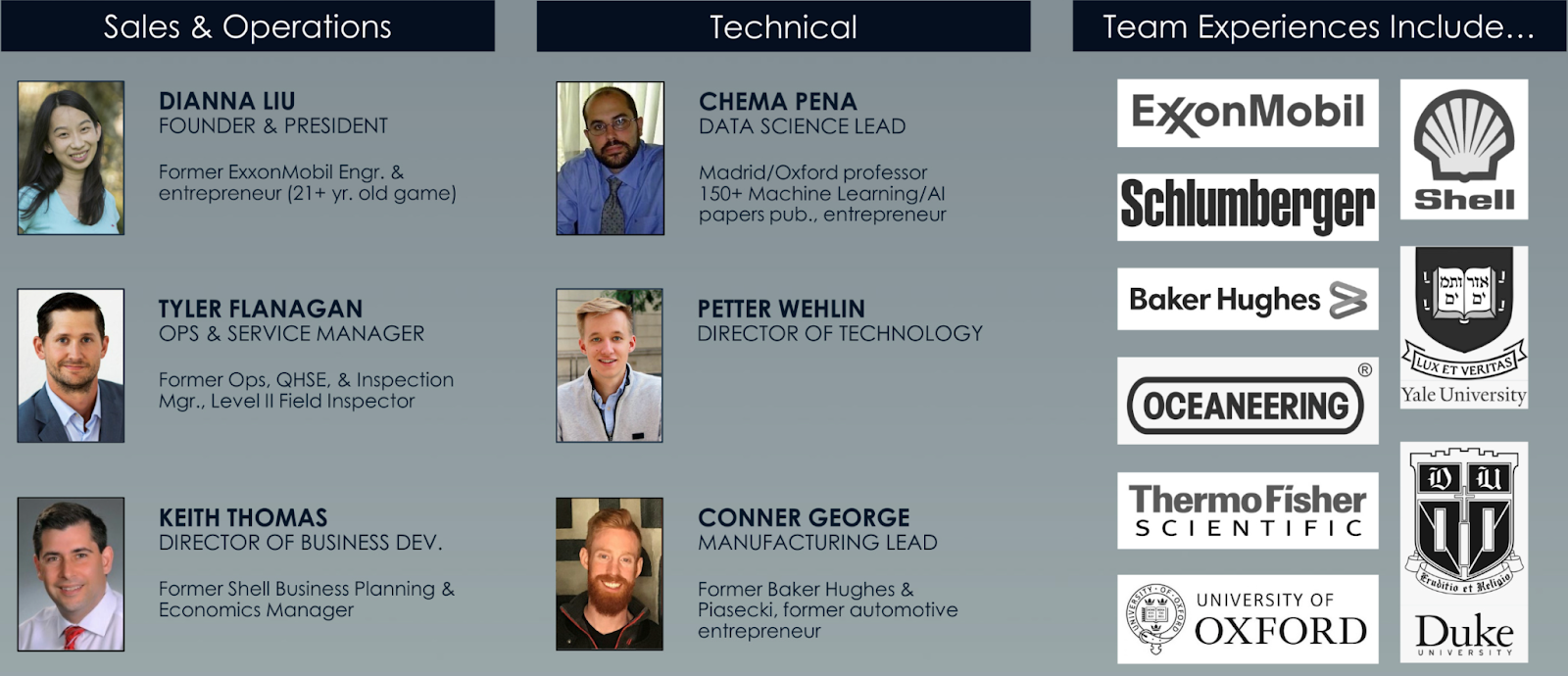
Leadership Team:
ARIX’s team integrates critical industry expertise with frontier technology excellence spanning experience from ExxonMobil, Schumberger, Thermo Fisher Scientific and academic and commercial data science expertise.
Dianna Liu (Founder & President) - Dianna is an accomplished engineer, entrepreneur and business leader taking her years of experience as a mechanical engineer at ExxonMobil to revolutionize infrastructure and intelligence for pipe corrosion. Diana received her MBA from Yale University, winning numerous awards including Yale School of Management’s Entrepreneurial Fellowship, McCance Entrepreneurial Award and Miller Prize for Disruptive Technology Award. She also has a dual BS Engineering degree from Duke University in Mechanical Engineering & Biomedical Engineering. Dianna also founded and led a 21-year-old gaming start-up which she founded in high school.
Petter Wehlin (Director of Engineering) - Leads ARIX robot systems design & future hardware technology plans. Peter’s experience spans Udacity Robotics Software Engineering Nanodegree Program, Yale Biomechanics & Control Lab and product development engineering at Againer (co-led development of fully functional prototype of leg exoskeleton) and European Spallation Source (computational chemistry), BoMill AB (designed & built novel testing platform for BoMill flagship product), & Wellinks (wearable device start-up). Petter has a BS in Mechanical Engineering from Yale University.
Jose Chema Pena (Data Science & Software Lead) - Leads all development and data science related to ARIX software analysis platform. Jose has over 150 papers published in Machine Learning / Artificial Intelligence. He serves as a professor of Data Science at University of Oxford and was formerly the CTO and Co-Founder of Lurtis Rules. He received a PhD from University of Madrid in Computer Science.
Keith Thomas (Director of Business Development and Sales) - Leads new business development, sales, and strategy at ARIX. Previously, Keith held several management and leadership roles in commercial and business planning at Royal Dutch Shell combined with technology sales experience. He received a PhD in Physics from University of Wisconsin-Madison.
Tyler Flanagan (Director of Service and Operations) - Leads ARIX inspection and field operations with a heavy focus on customer satisfaction, quality, and efficiencies Tyler spent 12+ years in the field of Non-Destructive Testing and previously led multiple inspection services at Schlumberger and CSI Inspection. He has a BS in Industrial Technology and a MBA from University of Texas – Permian Basin
Conner George (Director of Manufacturing & Internal Operations) - Leads manufacturing, supplier relationships and internal operations. He held various design engineering roles at Baker Hughes, Downhole Innovations and Piasecki Aircraft. Conner was also the founder of SpaceCitySpy Automatic Accessories and holds a BS in Mechanical Engineering w/ Materials Science minor from Vanderbilt University.
Awards:
ARIX recently won an industry challenge award granted by Shell, Phillips 66 and Woodside for “Best Robotic Solution Under Insulated Pipe Inspection”.

Plum Alley has seen the power of multimodal technologies and data analytics across air quality, water quality and natural disasters. The next frontier is taking advancements in robotics, sensor technology and data processing to enable utility, energy, chemical, and manufacturing companies to realize more sustainable management of their infrastructure. Companies in these industries need more data and transparency to achieve greater safety, efficacy, and sustainability. The data ARIX collects allows for safer and more efficient operations, while reducing the potential for disastrous failures or major leaks, which significantly impact human and environmental health and safety. A recent study led by the Environmental Defense Fund from 2012 - 2018 revealed that methane leaks from natural gas were far higher than government estimated amounts. The report suggested leaks were 60% higher than EPA’s estimates. The wasted gas is enough to fuel 10 million homes for a year, lost gas that's worth an estimated $2 billion. Further, combating these emissions is an important aspect of fighting climate change. Preventing pipe failures can also help prevent historical disasters that have resulted in millions of barrels of oil spilled, thousands of pounds of hydrofluoric acid being released into the environment, and thousands of local residents suffering health implications.